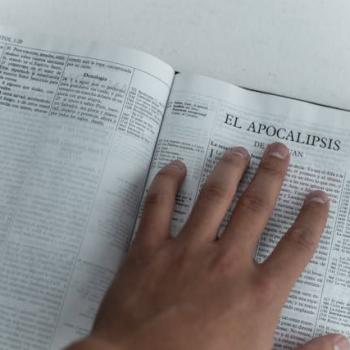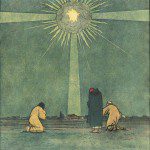Those pamphlets were written by avowed anti-Mormons. People of reason and good will are usually repelled by such hate literature, and sometimes are even sympathetic to the victims of such obvious lies. But what about attacks on a community written by members?
Back to Rushdie. Remember that countless Western authors have written about Islam in a negative or demeaning way, with few or no repercussions. Muslims might resent such writing, might try to refute it, but as long as everyone knows that the negative stories are being told by outsiders, they pose no particular threat to the epic of Islam -- the more anti-Islamic they are, the less credibility they have.
But Rushdie was not an outsider. Rushdie might have lost his faith, he might be living in a Western nation, but to Muslims these matters are irrelevant -- he wrote as a member of the Muslim community. He knew all the buttons to push. He knew all the ways to offend. And he used them.
Enemies of the Kingdom?
We don't have to go far to find a Mormon parallel. I quote from Sonia Johnson's own account in From Housewife to Heretic of a key moment in her church court:
Here is the direct quote from the transcript of the videotape [of Sonia Johnson's speech to NOW members in Kalispell, Montana]: "The leaders of the Mormon Church are somewhat isolated in Utah. Those who are directing this anti-ERA activity need a taste of the consequences of their behavior, and one of the things everyone can do is write and call church headquarters and say, 'I am outraged that the Mormons are working against my civil rights, and if your missionaries ever come to my door, I wouldn't consider letting them in'" (Doubleday, 1981, p. 332).
Johnson, as an insider, knew what pressure would be felt most by the Church. And because it was a Church member who was urging NOW members to proclaim a boycott of LDS missionaries, she had infinitely more authority than an outsider. How could this be anti-Mormonism, when a Mormon suggested it? The moment Johnson made this statement, however, she declared herself to have a higher allegiance than her allegiance to the Church. Any Mormon who gives greater priority to a non-Mormon cause than to LDS missionary work is not a Mormon at all. Johnson's excommunication was a formality -- she was already gone. Most Saints knew this at once. She was beyond the pale. But Johnson didn't see it that way. Indeed, she even claims that her suggestion to non-Mormon NOW members was a perfectly legitimate thing for a Mormon to do:
"That's political lobbying, pure and simple," I pleaded vainly with my prosecutor-judge and his cohorts. "Lobbying is deal-making: you have something I want, I have something you want. Let's make a deal. The church wants women to join the church, women want the church to unhand the ERA. Women should therefore say, 'If you'll listen to us, we'll listen to you.' That's political." (Johnson, From Housewife to Heretic pp. 332-33)
Here is the root of Johnson's apostasy; here is the attitude that led her out of the Church. She believed that revelation was negotiable.
Most Mormons easily accept the idea that revelation is responsive -- that is, that revelation comes at times when it is needed. Most of the revelations in the Doctrine and Covenants were given in response to requests, questions, or calamities. Most Mormons also accept the idea that revelation is not universal -- that many decisions or attitudes of bishops or stake presidents or even General Authorities are merely their own best judgment, and not the literal word of God; and almost all of us are suspicious of people who claim that every thought that enters their heads comes from God.
But what Mormons can't accept is the idea that revelations might come as a bargain, a compromise, a deal with some pressure group. Sonia Johnson was attempting coercion -- forcing the Church to comply with her program. Much the same thing was done by the federal government during the polygamy era; but at least none of the federal officials trying to force LDS compliance with anti-polygamy laws pretended to be members.
The root of Johnson's heresy was contempt for the principle of revelation and the living prophets, seers, and revelators who are called to govern the Lord's Church. That same spirit of contempt, that same urge to pressure the Brethren into doing what can only be accomplished by prayer, is still with us.
Transforming the Church
Open, public criticism of a Church doctrine or policy, especially from within the Church, is the single least effective way to change that doctrine or policy. All that such critics succeed in doing is demonstrating that they do not believe that the Lord gives revelation to guide the prophets, and that fact declares these critics to be enemies of the fundamental point of LDS faith: that God speaks to living prophets.




